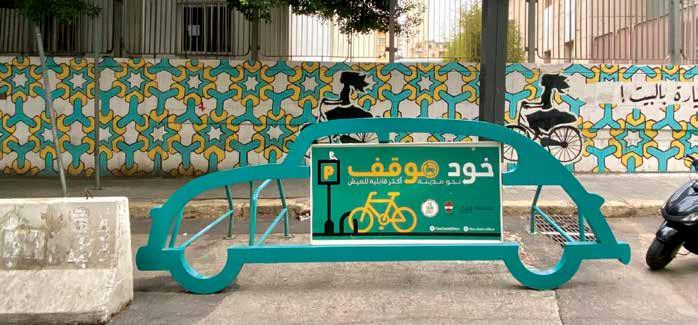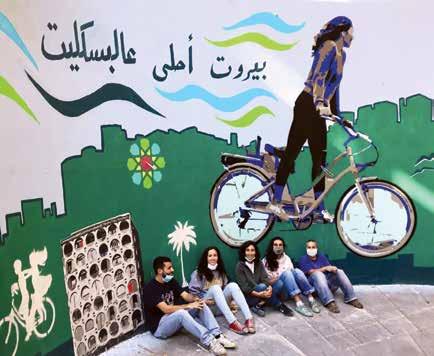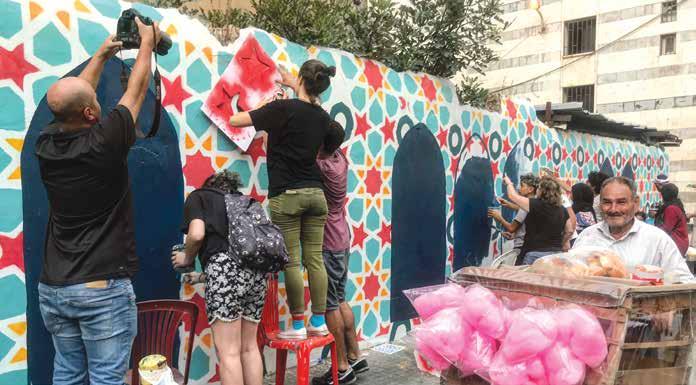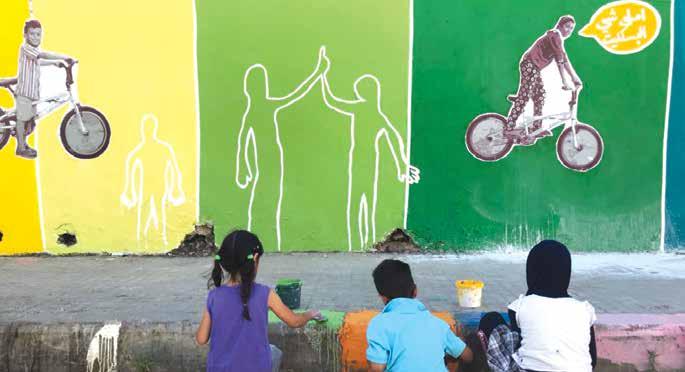
10 minute read
Zeina Hawa’s Campaign for Sustainable Mobility in Beirut
It’s a Chain Effect!: Zeina Hawa’s Campaign for Sustainable Mobility in Beirut
ATTENTION DRIVERS OF LEBANON!
Do you feel like your life is controlled by your car? Are you tired of waking up at the break of dawn for an hour-long drive to work that should only take you 20 minutes? Are you at your wits end with the 4-hour-long wait at the petrol station? Do you wonder what it would be like not to fear for your life when crossing the street?
If you answered yes to any or all of these questions – we may just have the solution for you! Just dial 1-800 to learn more and get your free sample today!
In all seriousness, Zeina Hawa ‘10 and her friends at The Chain Effect, the organization she co-founded in 2014, present a very convincing solution to all of your, and of Lebanon’s, car-related woes.
Commuting in Beirut is a notoriously unpleasant experience. Lebanon has one of the highest rates of registered vehicles in the world relative to population, which, coupled with poor infrastructure, renders traffic congestion a core aspect of Lebanese daily life. The average Lebanese spends an estimated 720 hours a year on the road, more than 16% of an individual’s supposed “productive time.” Traffic is just one of the many issues related to the excess of private transport and chaos of commuting in Beirut. Road rules and regulations are rarely enforced, leading to dangerous driving conditions and a high number of car-related accidents. Furthermore, the high volume of vehicles on the road is one of the main contributors to the country’s carbon emissions and air pollution. Car dependence and traffic have a significant impact on Lebanon’s economy. In 2017, traffic-related costs were estimated at $2 billion/year – nearly 4% of the country’s GDP. This number will likely increase in the future, due to costs related to population growth, car accidents and other related health issues, vehicle operation, and the long- term effects of carbon emissions and climate change.
cyclists, or other forms of ‘soft mobility.’ It really wasn’t designed to be - post-civil war development initiatives were very much focused on car-centric infrastructure. However, despite appearances, the city’s compact size, narrow street structure, and interconnectivity of neighborhoods, make it quite conducive to cycling.
“You can reach most places from where you are within half an hour…” Standstill traffic means that, while there are a lot of them, cars typically aren’t going that fast (speed is the most dangerous thing for cycling) - making Beirut a lot safer to cycle in than bigger, more sprawling cities with fast-moving vehicles, like London or New York.
Pre-existing issues are, of course, compounded by the current economic crisis and subsequent fuel shortages that has rendered gas scarce and expensive. All roads lead to increased congestion, stress around fuel, time wasted, and restrictions on movement for those for whom private transport is not readily available. So why, if car-dependent culture is such a huge issue in this country, do alternatives seem few and far between? Zeina Hawa is working to change this. After graduating from IC, Hawa went on to study Environmental Engineering at University College London (UCL) where she became interested in city-related mobility issues. She was exposed to biking as a mode of urban transport while living in Denmark and began to think more critically about cycling and its benefits in terms of urban mobility in a city like Beirut. “Mobility is linked to everything we do - our economic and social opportunities, our wellbeing…” She explained. Returning to Lebanon upon graduation, Hawa brought her knowledge, and knack for biking to work with her, and began to share her expertise with friends, colleagues, and ultimately the wider Beirut community. As Hawa says of Beirut, “It doesn’t strike you as a city where cycling should be the number one way of getting around. It’s a bit chaotic, people don’t respect driving rules, cars are really king.” She’s correct. At first glance the city does not seem like a particularly welcoming environment to pedestrians,
Hawa (2nd from right) and other Chain Effect team members outside another mural There are so many benefits to biking. Countless studies have proven that it can facilitate better physical and mental health, as well as economic and social cohesion. It helps combat sedentary lifestyles and obesity, increases endorphins (happiness!), and has the potential to significantly reduce air pollution from motor vehicles. In Beirut, cars and buses contribute to 93% of it. Cycling and walking have significant economic benefits as well - offsetting costs related to congestion, accidents, health, and pollution, as well as personal expenses. Fewer cars on the road means less traffic. Biking and walking also have the potential to increase equity and social cohesion. Not only do poorer households suffer disproportionately from Lebanon’s car-dependent culture, but the country’s car-oriented infrastructure has split entire neighborhoods apart and has made it challenging to travel to, and therefore engage with, different communities across the city. There’s a good chance you’ve seen some of The Chain Effect’s work across the city. The organization got its start promoting bicycle usage via street art, and their bright, colorful murals can be found all over Beirut. Hawa and The Chain Effect co-founder Elena Haddad were already involved in street art, and their mutual passion for cycling and their knowledge of the benefits of soft mobility in a city like Beirut merged with their artistic hobby. The first mural was put up at a busy intersection along the Beirut Marathon Route in 2014 which read: “If you were biking, you’d be there by now.” The mural got a lot of attention. So they made more. That’s where it all began. In the 7 years since it’s foundation, The Chain Effect has accomplished a great deal. It’s mission is to promote the bicycle as a sustainable and convenient form of urban

mobility and facilitate its use in Beirut through street art, public interventions, and holistic city planning. Aside from their eye-catching murals, one of their main initiatives is educational workshops and programming with different schools, organizations, and camps.
They have also compiled tons of resources, mapping shops to buy or rent bikes and routes for cycling around the city. They advocate for bike-friendly infrastructure projects, like bike lanes, in the city. Most recently, in response to Covid-19 measures which halted public transport, they’ve implemented an affordable bikes campaign and have provided subsidized bikes to 22 people who need affordable, alternative modes of transport.
One of their largest and most impactful projects is their annual Bike-to-Work event. For this day-long production, The Chain Effect works with the city municipality and bike shops to set up park and ride stations and to implement temporary bike lanes all over the city. They also partner with a number of cafes and restaurants who provide discounts to those biking on that day in an effort to incentivize people to join in. The hope is that once people try biking, they will realize it is a much more feasible and convenient option than they previously assumed.
If it is such an amazing alternative and solution to many of daily life’s frustrations, why has cycling struggled to take off in Beirut?
There is a certain culture around car ownership and a stigma around cycling as a form of mobility. People tend to think of biking as a leisurely activity or sport, not a mode of transport. Classist misconceptions mean many worry that biking could be perceived as “poor” (obviously, it shouldn’t matter either way). Because driving is facilitated and subsidized by the government, alternative modes of transport often just don’t cross people’s minds.
And then there is the safety issue. This is the biggest concern, according to a 2019 Chain Effect Survey. People just don’t think cycling and walking are safe options in a city where car-related accidents are so prevalent.
Hawa understands this hesitation. However, she says “It looks a lot scarier and more difficult to navigate if you are outside of it.” For Hawa, it’s really about getting people to just try. “For people who are a bit hesitant and afraid, it’s really about doing it in a step-by-step way. There are a lot of barriers and obstacles and it’s not easy to start cycling - no one is denying that. But there are smaller steps, like starting with exploring a neighborhood with a more experienced cyclist.” It’s not all or nothing. Maybe start by biking to work, or the supermarket, a few times a month.
Despite these challenges, Hawa does feel there has been a positive shift in the culture around cycling. “Even if it’s just at the level of conversations and people talking about this more - it’s already a good step in a city where this isn’t really a mode of transportation.” Especially in light of Covid and the current fuel crisis, there has been an increased demand for bicycles. In addition, there are a lot more initiatives related to cycling popping up all over the country. However, Hawa is cautious of being overly

optimistic. “Right now there’s a crisis of mobility so there’s a lot of focus on that, but I don’t know how long that will last… It’s hard to build momentum on that basis.”
Are you ready to jump on a bike but not sure where to begin? The Chain Effect’s website has a ton of resources about where to buy bikes and biking routes around the city. If you are not quite ready to take on cycling just yet, but want to get involved in the soft mobility movement, there are lots of other ways to help out. Funding is #1 at the moment - the organization has a lot of larger projects they would like to pursue but struggle with time and financing as it’s currently an entirely volunteer-lead organization. Volunteers are also always welcome - whether helping to paint murals or assisting with the less glamorous side of non-profit work. Overall, there are many ways to get involved and hopping on a bike is just one of them.
There is a lot of potential for the IC community as well to lead the push towards more sustainable transportation practices. Schools are one of the main generators of “useless car trips” which could be offset by promoting walking or cycling in the classroom, discussing it as a default mode of transport, facilitating a mapping program to help students who live within walking or biking distance map a safe route home, or implementing a buddy system and safe bike storage.
“It’s crazy that kids need to individually travel to school. I’m not even talking about walking or biking, even just going back one step to carpooling. If you still come by car, sure, but at least think about coming with maybe 2 or 3 kids in your class,” Hawa states. “I speak with nothing but love for my old school… but IC, as a private institution and a leader of education in this country, should definitely be taking the lead on this.”
What is Hawa’s main selling point for biking in Beirut? For her, the most rewarding aspect of switching to cycling has been the freedom it has given her to explore different parts of the city and connect with a diversity of people.
“Cycling was a way for me to really get to know all of the neighborhoods and just connect with people in a way you never really would by car… It’s endless and I don’t think anything can replace that [experience].” Places and people can surprise you, and in such tense times, this is particularly important. “Lots of areas that are ‘dangerous’ aren’t really dangerous. They are just areas where
someone who is not from your background lives… But being on a bike has allowed me to cross all of those social boundaries and class boundaries. People are suddenly a lot less aggressive and you see a lot more similarities rather than differences. It becomes a much less angry city when you are cycling.”




